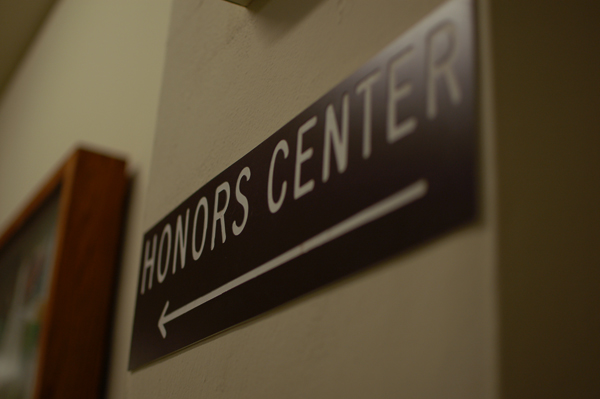
The Honors Program officials want to expand by including more of a “cross-section” of students from various academic backgrounds, according to Interim Director Dr. Patricia Sullivan.
“It’s mostly been liberal arts and sciences majors, and 75 percent have come from that area,” Sullivan said. “One motivation was to try to make the program more available to a greater range of students and to think about what we can do to make that happen.”
One of the changes to the program includes “major designated honors courses,” which are already in process and will be facilitated into a student’s area of study. These courses will be reviewed by an Honors Advisory Council to make sure it was pre-existing in the curriculum and can be applied to the program, according to Sullivan.
She explained other changes will be a required part two introductory seminar for first-year students, and the thesis will be formalized and won’t necessarily have to be in writing.
Still, the Honors Program has received some criticism for appearing exclusive.
“There’s been a little bit of an extent that it’s over here, that it’s apart and not integrating, but with reaching out to majors, and a greater cross-section of students, that’s going to change,” Sullivan said.
She hopes that what’s happening in the Honors Program can translate to the entire campus.
“Some things we do in honors could pilot what happens in a course and that could filter out to the student-body as a whole,” Sullivan said.
President Donald Christian said the assessment found the Honors Program wasn’t successfully integrating with all departments. He said Dr. Sullivan’s advocacy for the Honors Program shows her commitment to communicating between departments and furthering the integration process.
“There has been a sense that not every department has interfaced well with the Honors Program,” Christian said. “[The Ad Hoc Committee was charged] to figure out ways to develop models to make honors programming much more integrated with the programming for various majors.”
The Honors Program has stayed the same since the late ‘90s, but the campus community hasn’t, Sullivan said. She said the program needed to adjust to meet the demands of a “substantially changed” student body from the last two decades. Sullivan credited New Paltz’s higher admissions standard that is changing the face of the program.
“We have more students who would be eligible to do honor work now because the admission standard here is so high,” she said.
Meanwhile, Sullivan said that the admission process for the program is “holistic.” She said It’s not just based on grades, or on test scores. The program hopes to have a “cross-section” or “range” of students, from junior-college transfers, to “non-traditional students,” she said.
Since the assessment was completed, and the new guidelines go into effect for fall 2012, the only thing left is getting the word out so more students understand the Honors Program. Sullivan said she has done “serious recruiting” last summer at the orientations to find students to assist in this goal.
She also said the website for the program will be improved and that they’ve just started a Facebook page.
“Making sure students across classes know each other, so the end of the semester there will be a gathering to get the students to know each other,” Sullivan said. “[Also] looking at a peer mentoring program and I’m establishing a student advisory board. [Here I’m] going to have sub-committees within the advisory board, so the big group won’t meet that frequently but they will have tasks.”
Some of the tasks include managing the Facebook page, managing film series and alumni relations.
Christian also said keeping alumni and external bodies interested in the Honors Program was valuable.
“I am also talking to people about private fund raising to support the program,” he said. “I think that is a very attractive opportunity for philanthropy.”
